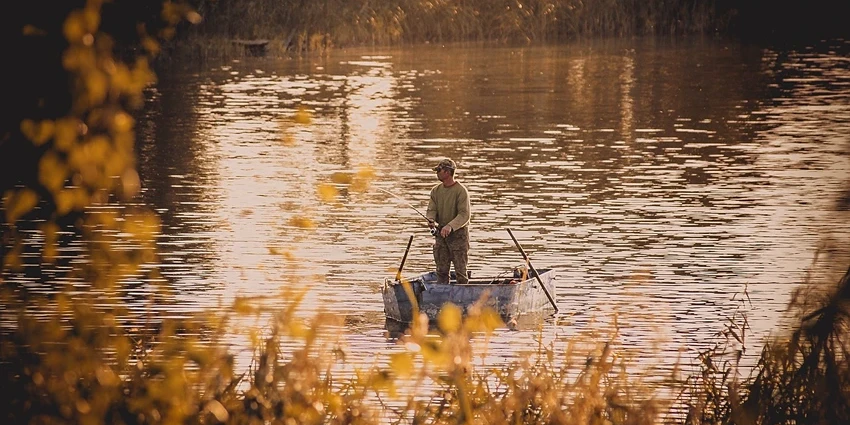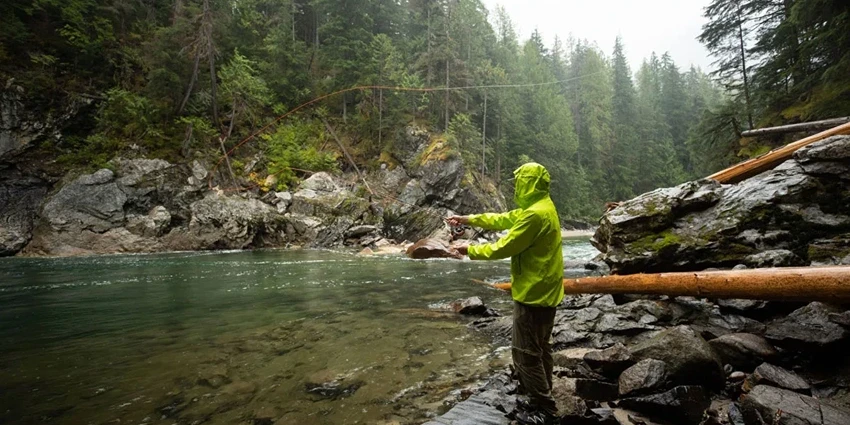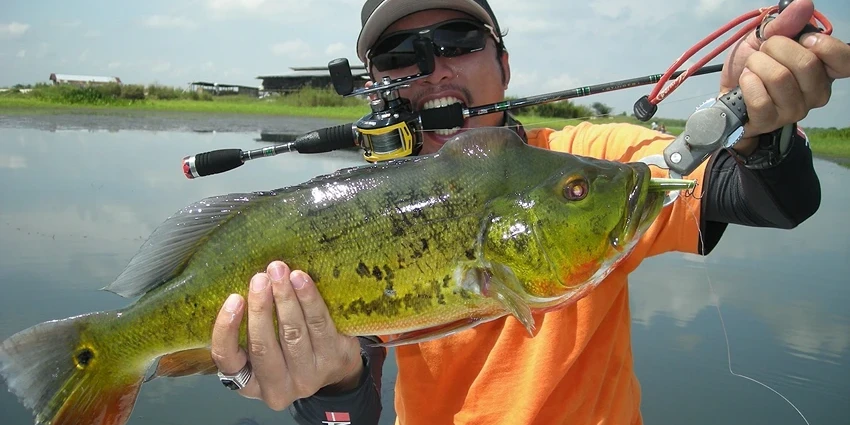All products were chosen independently by our editorial team. This review contains affiliate links and we may receive a commission for purchases made. Please read our affiliates FAQ page to find out more.
Ah, the allure of freshwater fishing! It’s not just about the catch; it’s about the experience, the tranquility, and the thrill. Whether you’re standing on the edge of a serene lake or casting your line from a gently rocking boat, freshwater fishing is an adventure that’s accessible to everyone. So, let’s dive into the world of freshwater fishing and explore the essentials that make this activity a favorite pastime for many.
Jump to:
Introduction to Freshwater Fishing
Freshwater fishing, a blend of skill and serenity, is a gateway to nature’s wonders. It’s an activity that transcends age and skill, inviting everyone to partake in its joys. Whether you’re a seasoned angler or a curious newbie, the freshwater realm is teeming with opportunities.
Why Freshwater Fishing?
- Diverse Locations: From the calm shores of a local pond to the expansive waters of a river, freshwater fishing spots are as varied as they are plentiful.
- Species Galore: Imagine reeling in anything from a feisty bass to a graceful trout. The diversity of fish in freshwater bodies is simply astounding.
- A Learning Curve for Everyone: Whether you’re mastering the art of casting or experimenting with different baits, there’s always something new to learn in freshwater fishing.
Essential Gear for Freshwater Fishing
Before you set out on your fishing adventure, it’s crucial to gear up appropriately. The right equipment not only enhances your fishing experience but also increases your chances of a bountiful catch.
The Basics: What You Need
- Rod and Reel: The backbone of your fishing gear. Choose one that suits your style and target species.
- Fishing Line: The link between you and your catch. Opt for a line that balances strength and visibility.
- Hooks, Lures, and Baits: These are your tools of attraction. From live worms to artificial lures, each has its unique appeal to fish.
- Tackle Box: Your fishing arsenal. Keep it stocked with essentials like extra hooks, sinkers, and a first-aid kit.
Table: Essential Freshwater Fishing Gear
| Gear Type | Description | Purpose |
| Rod and Reel | Varies in size and type | Casting and retrieving |
| Fishing Line | Different weights and materials | Connecting bait to reel |
| Hooks | Various sizes and shapes | Catching fish |
| Lures/Baits | Live and artificial options | Attracting fish |
| Tackle Box | Storage for fishing gear | Organizing essentials |
Legal Requirements and Fishing Licenses
Fishing responsibly means adhering to the rules. Before you cast your line, ensure you’re equipped with the necessary fishing license. It’s not just about legality; it’s about contributing to conservation efforts.
Getting Your License
- Where to Purchase: Licenses can typically be obtained online, at fishing shops, or local government offices.
- Contribution to Conservation: Your license fees help fund habitat restoration, fish stocking, and conservation programs.

Selecting the Right Fishing Spot
The perfect fishing spot is more than just a beautiful view. It’s about understanding the ecosystem and knowing where the fish are.
Factors to Consider
- Water Depth and Temperature: Different species thrive in varying conditions. Do your homework to find their preferred habitats.
- Accessibility: Whether you’re fishing from a boat or the shore, consider how easily you can reach your chosen spot.
Basic Fishing Techniques for Beginners
Fishing is an art, and like any art, it requires practice and patience. Start with simple techniques and gradually build your skills.
Techniques to Try
- Casting: The fundamental skill of fishing. Practice makes perfect.
- Bait Selection: Experiment with different baits to see what works best in your fishing spot.
Table: Basic Fishing Techniques
| Technique | Description | Best Used For |
| Casting | Throwing the line into the water | Most fishing situations |
| Bait Selection | Choosing live or artificial bait | Attracting specific fish |
Register for our latest in-depth reviews and product round-ups from the experts
Enter your email address below to receive our twice monthly reviews emails.
By entering your details, you are agreeing to our terms and conditions and privacy policy. You can unsubscribe at any time.
Conservation and Ethical Fishing Practices
Fishing is not just a hobby; it’s a responsibility. Practicing ethical fishing ensures that future generations can enjoy the same experiences we do today.
Sustainable Practices
- Catch and Release: Consider releasing your catch to maintain fish populations.
- Respect Wildlife: Be mindful of the ecosystem and avoid disrupting local habitats.
Freshwater fishing is a journey that offers endless learning and boundless joy. It’s about connecting with nature, honing your skills, and embracing the thrill of the catch. So, grab your gear, get your license, and head to your nearest freshwater body. Who knows what you’ll reel in today!
Advanced Fishing Techniques and Strategies
Elevating your fishing game requires a blend of skill, patience, and knowledge. Here’s how you can step up from being a beginner to becoming a more proficient angler.
Refining Your Skills
- Precision Casting: Mastering the art of casting with accuracy can significantly improve your chances of a catch.
- Using Advanced Lures: Experiment with a variety of lures to understand what attracts different species in various conditions.
Table: Advanced Fishing Lures
| Lure Type | Description | Best Used For |
| Spinnerbaits | Flashy, moving lures | Murky water, bass fishing |
| Jigs | Versatile, bottom-dwelling lures | Deep water, slow fishing |
Tactical Approaches
- Reading the Water: Learn to interpret water currents, structures, and depths to locate fish.
- Seasonal Strategies: Adapt your techniques to suit different seasons and weather conditions.
Understanding Fish Behavior and Seasonal Patterns
Fish behavior is influenced by a myriad of factors, including weather, water temperature, and seasons. Understanding these patterns is key to successful fishing.
Weather and Water Conditions
- Temperature Impact: Fish tend to be more active in certain temperature ranges.
- Weather Patterns: Changes in weather can affect fish feeding habits and location.
Table: Fish Behavior by Season
| Season | Typical Behavior | Suggested Strategy |
| Spring | Active, shallow waters | Light lures, frequent movement |
| Summer | Deeper waters, heat avoidance | Deep-water techniques |
| Autumn | Preparing for winter, active | Varied depths, aggressive lures |
| Winter | Slow, deep waters | Slow, steady techniques |
Tackle Box Essentials for the Advanced Angler
As you progress in your fishing journey, your tackle box should evolve too. Here are some must-haves for the advanced angler.
Advanced Gear
- Variety of Lures: A range of lures to suit different conditions and species.
- Specialized Tools: Items like a line cutter, pliers, and a digital scale can be handy.
Table: Advanced Tackle Box Essentials
| Item | Purpose | Benefit |
| Diverse Lures | Attracting specific species | Increases catch rate |
| Digital Scale | Weighing catch | Accurate measurement |
| Line Cutter | Cutting fishing line | Convenience and safety |

Casting Techniques for Success
Casting is an art that can make or break your fishing experience. Here are some techniques to master for a successful outing.
Effective Casting Methods
- Overhead Cast: The most common technique, ideal for distance and accuracy.
- Sidearm Cast: Useful for fishing in tight spaces or under overhanging trees.
Maintenance and Care of Fishing Gear
Taking care of your gear ensures its longevity and effectiveness. Regular maintenance is key to a hassle-free fishing experience.
Gear Upkeep
- Regular Cleaning: Rinse your gear after each use, especially when fishing in saltwater.
- Storage Solutions: Store your gear in a cool, dry place to prevent rust and damage.
Frequently Asked Questions
Let’s tackle some common queries that budding anglers often have.
Early morning or late evening are often the most productive times.
Look for areas with abundant natural structures like logs, rocks, or weed beds.
Overcomplicating gear choices and not paying attention to local fishing regulations.







